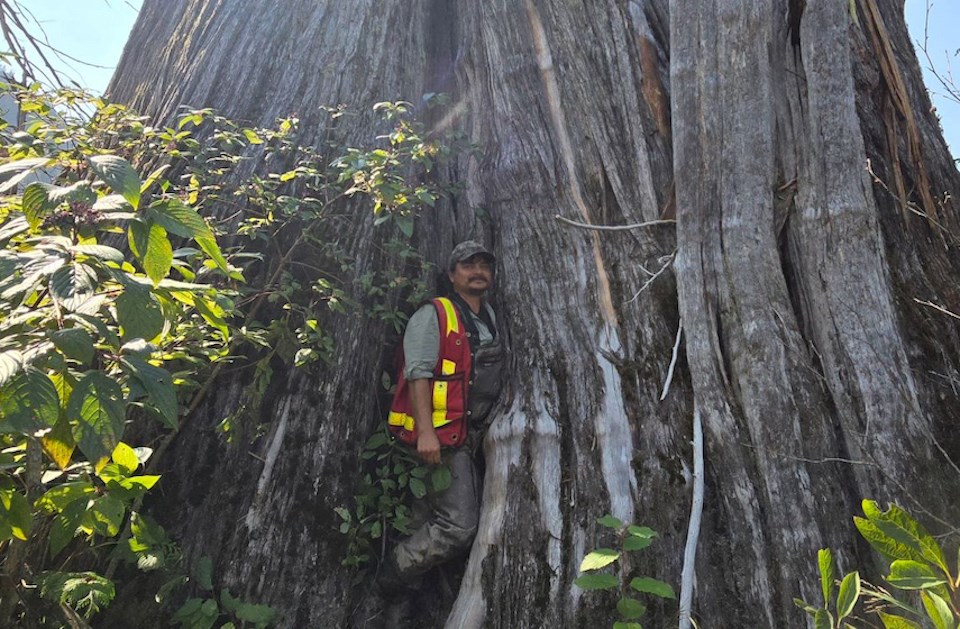Lil’wat Forestry Ventures (LFV) is leading a data-collection project to assess old-growth areas within the First Nation’s traditional territory. The Old Growth Stewardship Data Collection Project will give the Nation a snapshot of the forest to help promote wildfire management, wildlife habitats and the growth of traditional plants.
The key to the project is old-growth forest management. Decades of fire suppression policies preventing forest fires have led to unnaturally dense forests that don’t leave enough space for native plants and wildlife to thrive.
“I'm sure if you live in the Sea to Sky, you see how thick some of the forests are," said Klay Tindall, general manager at LFV. “That’s not normal."
“Normally, a lot of our Lil'wat Nation forests without fire suppression would see fires every, let's say, five years, and the forest would be more open.”
The solution to that prohibitive forest density, says Tindall, is to promote regular thinning and burning practices to reduce the availability of fuel for wildfires and allow other plant species to flourish.
“The traditional way the Lil’wat Nation would manage their forests would be to have cultural burns, which would basically thin the forest out,” said Tindall. “So what we're looking at is the opportunity to do forest-thinning areas as well as cultural burning, to bring back a lot of those ecosystems that the Nation would have managed up to a hundred years ago.
"In the past, the forest was their garden, [where] they could explore and pick what they needed ... now that's gone because all the forests are just trees."
Currently, between 15 and 20 per cent of Lil’wat forests are managed for timber harvesting trees and can be legally cut down by LFV crews. The remaining 80 to 85 per cent is protected and, therefore, unmanaged; it’s that protected space the stewardship project is studying.
This project has been in the works since the province announced old-growth logging deferrals back in 2021. The B.C. government launched the deferral plan in November 2021, allowing some areas to temporarily pause forest harvesting to "create space for discussion on holistic, long-term management approaches for old growth forests."
"It brought attention to the Nation that they don't really have a good grasp of what is currently being protected for old growth," said Tindall.
So LFV, in partnership with Stillwater Consulting, Chartwell Resource Group ltd., and the Lil'wat Nation’s Lands & Resources Department partnered on a multi-year research project to examine the extent of old growth within the protected area.
The endeavour, funded by the Rural Economic Diversification and Infrastructure Program (REDIP), began with training provided by Stillwater Consulting for LFV staff in early 2024. Tindall says it gave LFV the "knowledge to assess old-growth criteria," which his team then paired with cultural and wildlife values.
Data collection began in mid-October after the risk of wildfires diminished. Teams of three to five ventured out into pre-determined plots of land, angling to get a representative sampling of old growth. Tindall estimates about a third of the plots were completed before the weather turned. The remaining ones will be completed in spring 2025.
Once the data is compiled, LFV hopes to have definitive findings on the health of the old growth.
Over time, Tindall says the team's intended use for the data has shifted.
“Back [at the start], we were looking at harvest to lower the damage to traditional plants, and now we've really changed our mindset to, 'how can we do forest management practices that are going to increase the amount of good value of those plants?'” he said.
"[We're also] looking at any of the cultural values that might be on the site," Tindall added. "So [the team] have Lil'wat Nation cultural texts with them, helping to identify any cultural values."
The LFV said in a press release it hopes the project will not only inform old-growth forest management for the Nation moving forward but help provide a template for other First Nations to "assess forest health in their territories to make more informed land-management decisions."




